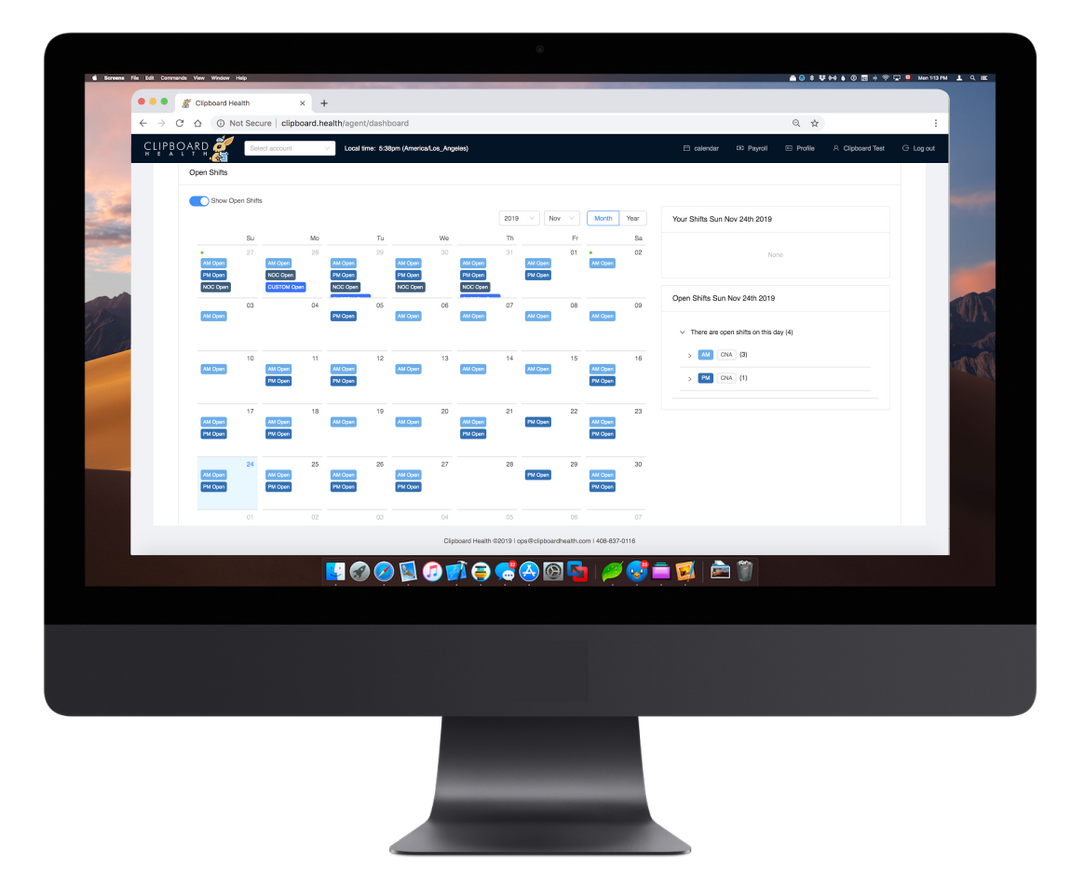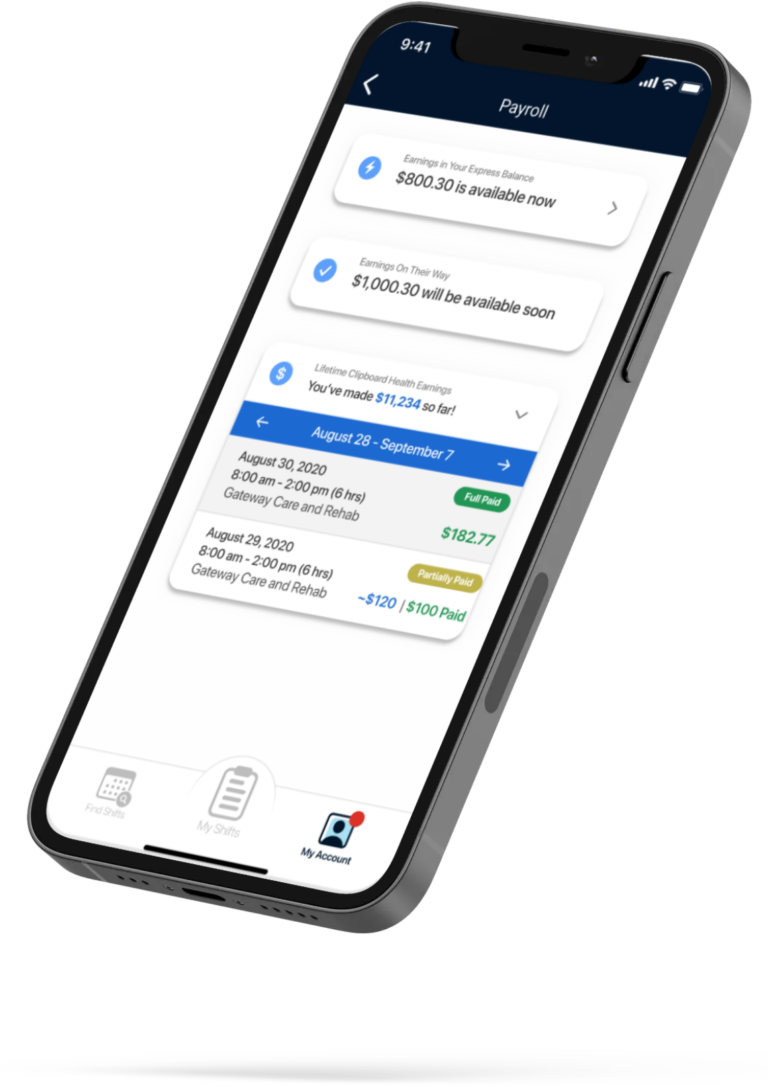Clipboard Health, an app-based marketplace that matches nurses with open shifts at nearby healthcare facilities, today announced that it raised $80 million over two unannounced rounds, a $50 million Series B round in 2021 and a $30 million Series C round this year, at a $1.3 billion valuation post-money. CEO Wei Deng says that the proceeds will be put toward hiring in all areas of the business, including in engineering, sales, marketing.
Short-staffed health facilities represent a long-term problem that the pandemic has made more acute. Since March 2020, the number of people working at U.S. hospitals declined by more than 2%, according to data from the U.S. Bureau of Labor Statistics, while emergency department wait times increased. A recent analysis of workforce data by Premier found that staffing shortages cost hospitals $24 billion during the pandemic.
In addition to worse care for patients and spiraling costs for administrators, short-staffed facilities lead to burnout among healthcare professionals. A 2021 Kaiser Family Foundation/Washington Post poll found that about three in 10 healthcare workers considered leaving the profession while about six in 10 said pandemic-related stress had harmed their mental health.
“It’s a feedback loop that’s amplifying itself, because the more healthcare professionals leave the field, the faster the ones that remain are likely to burn out from their increased workload,” Deng told TechCrunch in an email interview. “The only way to change this damaging trend is to radically increase the number of healthcare professionals with interest in and access to opportunities at hospitals and nursing homes. To do that, you can’t rely on old methods. Those are the tools that won’t fix the current problem.”

A tool that might — she somewhat biasedly believes, being its founder — is Clipboard, an online marketplace that pairs nurses, nursing assistants and other healthcare professionals with facilities in need of staffing. Using the platform, facilities can post shifts they need to fill and healthcare workers can book these shifts, managing their schedules via Clipboard’s mobile app
Currently serving workers in more than 30 U.S. cities, including Los Angeles, Philadelphia, Chicago and New York, the goal is to bring Clipboard to “many more” locations by the end of the year, Deng says. “What we’re doing is allowing healthcare professionals to sign up for shifts when and where they want, often at facilities where they’ve never worked before, and leverage their latent hours if they choose to. So hospitals and nursing homes are tapping a much deeper pool of healthcare talent and, at the same time, healthcare professionals are seeing a lot more opportunities,” she added.
App-based marketplace
Deng founded Clipboard six years ago, after stints as an associate at law firm Davis Polk & Wardwell and investment bank Moelis & Company. Also prior to Clipboard, she led product management and business operations at Sendwave, an international money transfer startup.
“I started looking for customers with economic problems that we could try to solve, or broken markets that we could work towards fixing,” Deng said. “In the course of meeting a lot of prospective customers, I saw how many of the healthcare professionals I talked to — how many nurses — wanted opportunities to do the work they loved on their own terms, with more flexibility. Eventually we realized that the market for healthcare talent was broken. You have healthcare facilities, like hospitals and nursing homes, that are chronically short-staffed. You have healthcare professionals, like nurses and certified nursing assistants, who are getting overworked and burned out, especially during COVID. And you have patients who are slipping through the cracks, because they can’t get the care they need.”
Clipboard is a two-sided marketplace, counting over a thousand healthcare facilities and tens of thousands of professionals as customers. Besides incumbent staffing agencies, Deng acknowledges that there are several startups with business models similar to Clipboard’s, like NurseDash, CareRev and Nomad Health, which focuses on travel nurses. But she notes the distinguishing features of Clipboard’s platform, like instant payment after shifts.
“[W]hat [the] software does well [is] lowers barriers to information. In this case, the information is about who needs shifts to be filled, and who is willing to fill them,” Deng said. “American society is aging. The country will need more and more nurses. But U.S. can’t even meet its needs for caregiving now. How are we going to do it in five to 10 years, when the demand is higher and the supply is lower? We think talent marketplaces like ours are a key part of the solution … Our platform gives [new and veteran professionals] access to opportunities and flexibility that a single full-time job couldn’t provide.”
Helen Poitevin, Gartner research VP, told TechCrunch via email: “Once dominated by brick-and-mortar staffing agencies, new digital staffing platforms are emerging for shift or job-based flexible work in industries such as hospitality, retail, logistics, travel and healthcare. Will they survive? We’ve already seen some, like Shiftgig, pivot. Others, like Jyve, appear to be out of business. Just like today’s gig platforms, these new digital staffing platforms need to build robust matching and optimization technology as well as strong brands to attract both employees and employers. The best will use technology to make flexible employment compliant, high-trust, faster, easier and a better experience for all concerned. In this case, employers might even want to use them for their own employees in addition to temporary workers. Other platforms will simply be like traditional staffing agencies with a digital front-end — less disruptive and more easily replicated by those same traditional staffing agencies.”
Some experts believe that a reliance on contract nursing, which often commands higher salaries compared to staff positions, is leading to a vicious healthcare hiring cycle. Hospital administrators spend more hiring contractors, making them less able or willing to increase their staff nurses’ pay — so more staff nurses quit to become contract nurses.
The average pay for a traveling contract nurse has risen from $1,000 to $2,000 per week before the pandemic to $3,000 to $5,000 since after the pandemic, the Associated Press reports.
But Deng pushes back against the notion, arguing that Clipboard “let[s] the two sides of the market choose each other.” In other words, healthcare facilities can pay below market rates if they find a nurse willing to take the shift.
“It’s really easy and simple for our customers, and that’s how we think it should work for everybody,” she continued.
Growth opportunities
Underlining the appetite for startups like Clipboard, venture capitalists in the U.S. invested $37.9 billion into digital health startups in 2021, up 75% from $21.7 billion in 2020, according to CB Insights.

Clipboard, riding the wave, plans to use the data that its platform generates (e.g. how healthcare facilities source talent) to glean insights into the broader healthcare market. “[We have a] data science team that supports our marketplace, sales, support and marketing teams, and we’re doing our best to make smart matches that meet the needs of facilities and caregivers,” she continued. “[W]e’re throwing everything we can at the problem, including machine learning, because we think it’s important and it will affect a lot of lives.”
Clipboard’s gross revenue increased by roughly 25 times in the last 18 months, and the latest funding brings the company’s total capital raised to $90 million. That, Deng says, should be sufficient runway to build out new teams to support the company’s growing business.
“[The pandemic] caused enormous stress on the system, and the healthcare workforce hasn’t recovered yet. Fewer people work in hospitals now than they did right before the pandemic hit. That means healthcare facilities are still scrambling to find caregivers to fill shifts,” Deng said. “Our customers have been at the center of the storm, and I’d like to think that our product made it easier for patients to get better care, and changed a lot of lives. I hope we’re getting closer to being out of the woods. But the deeper, chronic trends behind the shortfall of healthcare talent remain.”
Clipboard’s latest round was led by Sequoia Capital, while the Series B was led by IVP. Other investors include Y Combinator, Caffeinated Capital, Initialized Capital and SciFi VC.































Comment